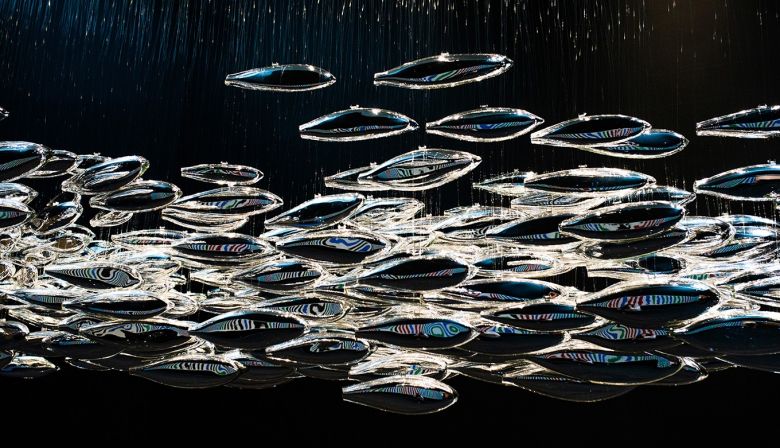
Subscribe & stay up-to-date with ASF


Fredericton, N.B. — When delegates from around the globe gather next month in Glasgow, United Kingdom, for the 2021 United Nations Climate Change Conference, known as COP26, they will encounter a school of 300 handblown glass salmon suspended inside the UN managed Blue Zone where negotiations will take place.
It is art with a clear message: the conservation and restoration of wild rivers and wild salmon contributes to the fight against climate change. Fish like Atlantic salmon need cold, clean water surrounded by healthy forests and wetlands. Intact landscapes sequester carbon dioxide, help keep water cool, buffer against severe weather, and are biologically rich and diverse.
Artist Joseph Rossano directed an international team to create the work, known as Salmon School. The effort was supported by a transcontinental partnership of organizations that stretch from the Pacific Northwest to the Northeast Atlantic including the Atlantic Salmon Federation, Atlantic Salmon Trust, Salmon Nation, Wild Salmon Centre, and the Smithsonian Institute.
Speaking about the project, Rossano said, “As wild salmon are threatened, so are we. Salmon School is inspired by the plight of wild salmon in places like the Upper Skagit in B.C. and Washington, the Penobscot River in Maine, and the River Clyde which flows through Glasgow. It’s also inspired by people and communities everywhere working to conserve, protect, and restore cold water fish in the face of climate change.”
ASF President Bill Taylor said, “Climate change affects every life stage of wild Atlantic salmon. Our participation in this conference is an occasion to elevate wild salmon on the world stage. It will allow us to reach important decision-makers and open new opportunities for big, ambitious conservation projects.”
COP26 has four main objectives and salmon conservation contributes to or benefits from each one:
Access to the Blue Zone at the Scottish Event Campus in Glasgow is restricted, so to share images of Salmon School and the story behind its creation, the project partners have created www.thesalmonschool.com.
A gallery of downloadable images is available here
To request interviews contact:
Neville Crabbe, Atlantic Salmon Federation
(506) 467-6804
ncrabbe@asf.ca
ASF is North America’s leading Atlantic salmon conservation organization, supported by a network of more than one hundred affiliated councils and watershed organizations in Maine and Eastern Canada. ASF conducts research on wild salmon throughout the North Atlantic, performs complex river restoration projects and advocates for good environmental decisions. Internationally, ASF negotiates conservation agreements with commercial fishers in places like Greenland and the Faroe Islands.